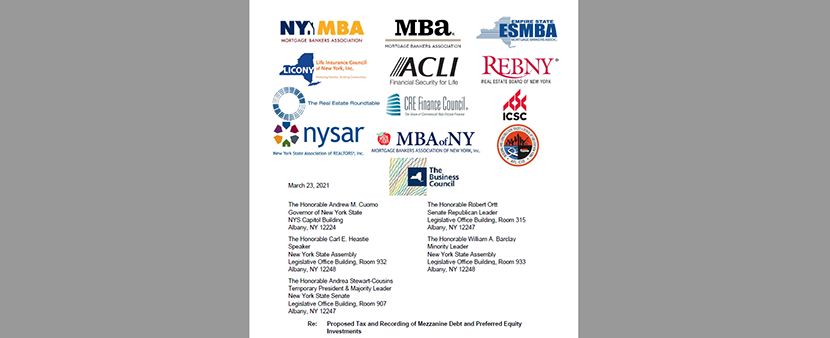
MBA Letters Oppose Proposed N.Y. Mezzanine Debt/Preferred Equity Tax, Support Like-Kind Exchanges

The Mortgage Bankers Association weighed in to oppose a proposed New York tax and recording requirement for mezzanine debt and preferred equity and to support like-kind exchanges.
MBA led a coalition that sent a letter to Governor Andrew Cuomo (D) and legislative leaders that opposes a proposed tax and recording requirement for mezzanine debt and preferred equity. The letter said enacting these taxes would exacerbate New York’s affordable housing challenges and effectively increase rents on low- to middle-income New York families and small businesses.
Last weekend, the New York Assembly and Senate unveiled annual state budget proposals, both of which included this new tax proposition. Cuomo’s budget, which he proposed in January, did not include tax increases. The state’s deadline to pass a budget is April 1.
MBA members who live or work in New York can click here to learn about a MBA Mortgage Action Alliance Call to Action. For more information on the New York proposal, contact MBA’s William Kooper or Grant Carlson. MBA will continue to work with state and national industry partners to oppose this tax’s enactment.
MBA and more than 30 organizations sent letters to Congress and to the Treasury Department last week to highlight how Section 1031 like-kind exchanges benefit the marketplace. “Like-kind exchanges of real estate under Section 1031 of the tax code support job growth and investment, the health of U.S. commercial real estate and real estate markets and the preservation of family-owned farms, ranches and forestland,” the letters to the Senate Finance Committee, House Ways and Means Committee and Treasury Department said.
The letters noted communities and nonprofit organizations use like-kind exchanges to conserve land for the benefit of the public and future generations. Gains reinvested in new property through an exchange create a ladder of economic opportunity for small and minority-owned businesses and entrepreneurs and generate much-needed tax revenue for states and localities. “Like-kind exchanges will continue to contribute significantly to the nation’s economic well-being and help us recover more quickly from the pandemic,” the letters said.
